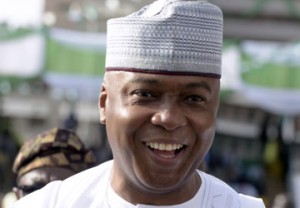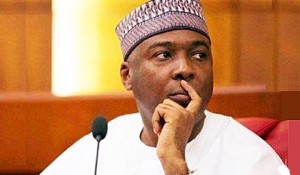
ABUJA, Federal Republic of Nigeria. Senate President, Bukola Saraki, has asked the Code of Conduct Tribunal to give him same treatment it gave former governor of Lagos State, Senator Bola Ahmed Tinubu, who was freed of allegations of misconduct by the tribunal in the year 2011.
Saraki’s counsel, Chief Kanu Agabi (SAN), made the plea on Friday during the tribunal’s hearing of an application brought by his client seeking to quash a 13-count charge bordering on false assets declaration preferred against him by the Code of Conduct Bureau (CCB).
Agabi prayed the tribunal to apply the wisdom it employed in dismissing the charges against Tinubu to the current case involving his client because the facts of the two cases were same.
But in a swift reaction, counsel for the CCB, Rotimi Jacobs (SAN), countered Agabi’s submission, arguing that Tinubu was discharged in error for the sins the Bureau had deemed the former governor to have committed when he held sway in Lagos State between 1999 and 2007.
Agabi had argued that the tribunal lacked jurisdiction to entertain the charges on the grounds that the Attorney-General of the Federation (AGF) and Minister of Justice lacked the powers to file charges before the tribunal.
Agabi also argued that the failure of the CCB to invite Saraki to confront him with the alleged breaches in his assets declaration form was fatal to the validity of the charges preferred against him.
He premised his argument on preliminary objection to the charge on the grounds that the conditions precedent for the arraignment of Saraki by the CCB was not fulfilled.
Agabi told the tribunal that up till now, Saraki, as a defendant, had not made any statement to the Bureau upon which he could be effectively put on trial.
He said the AGF was wrong in law to initiate the charge against Saraki because the Code of Conduct Bureau Act vested power in the Bureau to accept asset declaration form, investigate assets form and prosecute any offender and not on any external force like the AGF or the Economic and Financial Crimes Commission (EFCC).
“CCB is a peculiar institution; it has the duty to accept, to examine, to keep custody of assets declaration forms submitted to it and also has the power to accept complaints from the public on the discrepancies that may arise from any form submitted to it.
“In the instant case, there is no petition or complaint before the CCB and the power of the CCB to refer any offender to the CCT for trial cannot be delegated to the AGF,” Kanu argued.
Agabi then cited the trial of Senator Tinubu who was accused but was set free by the tribunal because of, according to him, the failure of the CCB to fulfil a necessary condition of inviting him first to make statement on the alleged discrepancies before referring him for trial.
According to him, such measure should also apply to Saraki because he was not first invited by CCB to make statement of denial or confirmation of discrepancies in his assets declaration form.
He, therefore, urged the tribunal to dismiss the charge against his client for being “incompetent, baseless” and having been filed without observing the due process of the law.
However, in his submission, the prosecution counsel, Jacobs, told the tribunal that the Ministry of Justice referred the trial of Saraki to the CCB on the strength of a joint investigation carried out by the EFCC and the Independent Corrupt Practices and Other Related Offences Commission (ICPC) in which the defendant was found to have procured assets that were not declared in his form.
He further told the tribunal that the CCB did not need to invite the defendant to make any clarification on the discrepancies in his assets because Section 3, Part One of the Third Schedule of the 1999 Constitution had removed such conditions.
The prosecution counsel also stated that CCB did not need to obtain any statement from Saraki before referring him to the tribunal for trial because the defendant had already made a statement on oath while declaring his assets.
On the claim that the trial was initiated 13 years after Saraki had left office as governor of Kwara State, Jacobs said that there was no time limit for the prosecution to investigate or charge anybody to court.
He then urged the tribunal to dismiss the motion for being “spurious, unfounded and baseless.”
On the issue of Tinubu being set free by the tribunal on the grounds of a failure on the part of the CCB, Jacobs argued that the tribunal arrived at the decision in error.
After listening to the arguments of the two parties, the Danladi Umar-led tribunal fixed March 24 (Thursday next week) to deliver ruling on the application.
Credit: Tribune (Nigeria)



